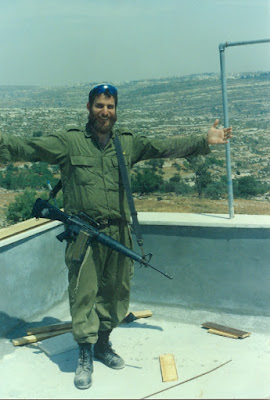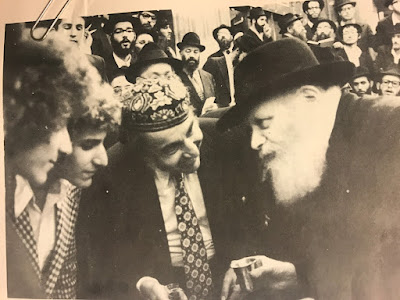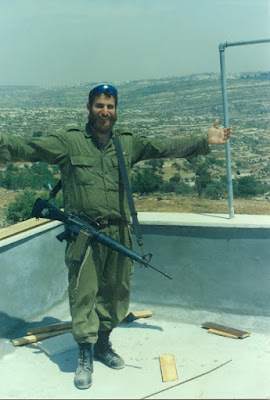Interview conducted by Sharona Cohen
Baruch Gordon tells about his journey to Israel and the Bet El Yeshiva, and provides some perspective for Jews struggling with the decision to make Aliyah.
1. Tell me about your childhood
I was raised in a Conservative Jewish home with a lot of warmth and love for Jewish music and all things Jewish. My family's observance level was like that of most Conservative Jews of the 1970s - we went to the synagogue on Shabbos, but we drove there, we didn’t lay tefillin, etc. But there was a warm Jewish feeling, and we were a very Zionist-inclined family. My Dad told me he almost regurgitated on the first day of the 6-Day War when the initial reports were from the Arab propaganda machine saying that the Jewish State was being wiped out. In the 1973 war, I remember him enraged in the front of the TV reports and, on the spot, writing a check to "donate bullets to kill the enemy."
When I was 12 years old my parents went to Israel for the first time, and they came back even more enthusiastic and supportive. Israel was a big part of our lives.
There were four huge factors that influenced me religiously when I was growing up:
1) Camp Ramah - I went to Camp Ramah after 7th, 8th, 9th and 10th grades, and the experience gave me a huge push towards Israel, speaking Hebrew, and getting knowledge of the Hebrew language and Judaism, including religious observance. Every year I came back from camp more religiously observant. Every year, I’d come back and increase my level of kashrut observance. I was the one who initiated it in my home, and eventually after three years of me asking to keep more and more stringent levels of kashrut, our family kashered the dishes. My parents made the decision that we would all keep kosher - we were all evolving together, and we became a kosher home.
2) USY - United Synagogue Youth, the youth group of the Conservative movement, was a very positive Jewish experience for me. A huge focus was encouraging marriage with a Jewish spouse. I became very active in the organization, eventually becoming USY's international president.
3) As an adolescent, my father befriended a very important Chabad shaliach Rabbi Moshe Kotlarsky, who was on the secretariat of the Rebbe. When I was 12 years old, and again when I was 14 years old, he invited us to 770 in Brooklyn for Simchas Torah. My brother and I went with my father and it was an extraordinary experience. We actually met the Rebbe and had an exchange with him on both occasions. I had never experienced anything like the unlimited joy and dancing in an atmosphere of purity. This was life-changing and a hugely influential factor in the Jewish observance of myself and our family.
In the above pic, the Rebbe told my father that he should be the Rebbe's Shaliach to teach Torah in Memphis. My father felt there was some deep misunderstanding and clarified to the Rebbe that he doesn't know Torah to teach it. The Rebbe replied, "So learn Torah and then teach it." Instead of trying to bring my father closer to Torah, the Rebbe skipped to the next stage turning my father into an activist to spread Torah. And that's exactly what happened.
4) From the middle of 8th grade, I was accepted to the finest scholastic school in Memphis, which was an all boys Presbyterian prep school, and only 9% Jewish. We went there to get the best education that Memphis had to offer. It was obligatory to study New Testament, and there were twice-per-week services in the chapel. Standing out as a Jew was something that actually bolstered my pride in my Jewish heritage. It was like swimming upstream. School policy was that every student ate the school's lunch. I was the only one out of 600 students who brought his own lunch from home. On Passover, many friends came to watch me eat matzah, which some of them believe is Jesus' flesh. I told them that it was actually quite tasty with peanut butter.
I actually put on a yarmulke in the middle of 11th grade - a bright orange yarmulke so that everyone would see from afar that I was Jewish. I was announcing that and very proud of it, even though I wasn’t yet religious.
2. How did you find your way to Israel and what did you do when you got here?
The summer after 11th grade, I came to Israel on the Camp Ramah pilgrimage to Israel and for me it was a wonderful experience. I bonded with Israel immediately, and one of the program counselors told me on the last day that of the entire group that was here, I was the one that would come back and live here. And that’s exactly what eventually happened.
I went on to Tufts University and had plans to come to Israel on my junior year abroad. But after facing the anti-Israel sentiment on campus for the first time in my life (back in the early 1980s, there was no anti-Israel activism in Memphis), I collapsed spinelessly. I wasn't able to answer any of their arguments, and I didn't know any of the history of Israel. So, I decided to come to Israel in my sophomore year with the objective of learning the history and being able to answer anti-Israel arguments. I also had plans to find a night class at a yeshiva. A few people had told me that if I’m interested in a yeshiva for beginner, there’s a place called Machon Meir that is a Zionist-oriented authentic Orthodox yeshiva.
I went to check out Machon Meir on a Friday, and thought about it over Shabbat. I had walked in with short pants and tzitzit sticking out, feeling like I was super Jew, having been very active in my youth group and having now put on the yarmulke and tzitzit. At Machon Meir, I realized that I had so much to learn, and I was really very far from understanding what Judaism was all about. So, on Sunday I left the Ulpan at Hebrew University and came to Machon Meir full-time, with the intention of considering after a month or two whether to go back to university classes when they start.
3. What brought you to Bet El originally?
I ended up staying at Machon Meir for two years. After those two years I wanted to move on to a full-fledged zionist yeshiva - not one for beginners. A friend from Machon Meir came to Bet El from Machon Meir and seemed very happy. There weren’t that many choices back then for a Zionist yeshiva of higher learning, and I chose Bet El and felt at home immediately. I just felt it was the perfect place for me.
At the Bet El Yeshiva back then, there was no restaurant in town, no stores except for a mini-market, really absolutely nothing to do except immerse oneself in full-time Torah study. Not having any distractions at all was conducive to serious Torah study. It was away from Jerusalem, in the hills of Samaria, and there weren’t that many busses to Jerusalem back then. The phone system was really something; when we picked up the receiver to make a phone call we had to wait approximately 30 minutes to an hour to get the dial tone in order to make a call. When I say no distractions, I mean zero.
4. How long have you been working at Bet El Institutions and in what various capacities?
After years of learning in Yeshivat Bet El, the Rosh Yeshiva agreed to start a program for graduates of the IDF. Until then, all the guys who came to the Yeshiva came right out of yeshiva high school and just continued learning. And now we were going to open a program for guys who went to the army first for three years and sought serious Torah learning for the first time after their service. I built the program and taught halakha and the Kuzari. A brilliant Bet El Rabbi who lost a finger in the Yom Kippur taught the Gemara class.
In 1994, we tried to open a program for overseas students despite the fact that the security situation at the time was very difficult. The Rosh Yeshiva Rav Zalman Baruch Melamed always does programs that will "fill a vacuum" and thus have high chances of success. He said that with a difficult security situation in Judea or Samaria and with no strong tradition of English-speakers coming (like the yeshiva in Gush Etzion), he wasn't sure it would succeed but was willing to try it. So, I traveled to the states and England several times over the year to recruit students and launched a newsletter in English, and had a bunch of students interested. One after the other, their parents rejected the idea of their son studying in "the West Bank." In the end, two students came. So the program only partially succeeded.
The Bet El Yeshiva launched Arutz Sheva radio and in 1988, I was asked to organize three hours a night of English radio. That was challenging and fun, and thrust me into radio.
Then, in 1995, Ketzaleh came to me saying that there was this “new thing that people are getting into called ‘intranet’ or ‘internet’ and they get information. They somehow connect to some world network from the computer." He was trying to describe it to me, and I didn’t understand what it was. This was 1995. In the end, Ketzaleh asked me, being one of the people working at the Yeshiva who was good at computers and knew English fluently, to launch the internet site of Arutz Sheva. So that’s what I did. In the end of August, 1995, we launched the Arutz Sheva English site, and I hired Hillel Fendel (ed. note: the Bet El newsletter's in-house translator) right after I started. He was writing the news, and I was editing and also writing news.
The internet site was an immediate smashing success. Thousands of people signed up to our email list, which was the main means of communication. And our website had hundreds of thousands of hits (which was the way they measured website success back then). As the English department grew I managed the department for 14 years, from 1995 to 2009.
5. What is your job today at the Institutions?
In 2009, our CEO and founder of Bet El Institutions Ketzaleh was elected to the Knesset, and headed the political party called the National Union. At that point he couldn’t continue fundraising with full force the way he had previously, and he asked me to leave Arutz Sheva and join forces with him in fundraising. So in 2009, I parted from Arutz Sheva, which is still under the umbrella of Bet El Institutions, and since then I’ve been working with Ketzaleh and meeting the wonderful Jews in the United States. They are true and real leaders - people with tremendous love and dedication for the Land of Israel. And they all play a huge huge part in everything we’re doing in Bet El. People give from their hearts, they give in tremendous amounts, with a lot of love and mesirut nefesh [self-sacrifice], and this is really what fuels everything we’re doing in Bet El. We are full of gratitude for our brothers who partner with us.
6. Tell me about your family
I met my wife through a mutual rabbi who I knew from Machon Meir. She was living at his house as a live-in, and I was going to Shabbat lunches at his house. He introduced us after I was already in Bet El. I got married when I was 21, and my wife was 20.
We have seven children and today three of them live in Judea and Samaria. I have one son in Havat Gilad and a daughter in Kida. I have a daughter in the garin torani [religious-Zionist shlichut in Israel] Hadar neighborhood in Haifa. I have another daughter who moved to Yerucham, and and I have three sons who are not married (eligible Jewesses may contact me). One is in Sayeret Givati in the IDF, and now he’s moving over to teach Arabic in the army. One is in Haifa University studying Law and Economics. The third is growing marijuana in Oregon. All my kids are special and beautiful.
7. Tell me your wildest “Zionist adventure” story
Just getting up every morning and going about my day as a Jew in the Land of Israel is a wild Zionist adventure. I often ponder how it is that 99% of my Jewish acquaintances, colleagues, and friends that I grew up with don’t live in Israel. Yet, here I am with my 20th grandchild in the oven, and leading a fulfilling, wonderful life in Israel. That is a wild Zionist story. By the way, many people advise Americans in Israel to marry a fellow English speaker to minimize culture clash. One problem there is that you end up as a couple with no parents in Israel, and no family to go to for an occasional Shabbat. My recommendation is that you drink a lot of Turkish coffee and eat a lot of zechug (Israeli hot sauce) until you live and breathe Israel, and then marry an Israeli. The day after the wedding, you are suddenly welcomed into an extensive family which, for me, was and is a wonderful network of support.
8. If you could relay to our readers any message about Israel, what would it be?
First of all, I sometimes hear Jews in Israel saying about the Jews overseas, "What are they doing there? They must come on Aliyah immediately!" I beg to differ. Having visited multiple Jewish communities overseas in my fundraising work, I witnessed firsthand that the our brothers overseas are truly beautiful and leading beautiful, meaningful lives infused with Torah and love for all things Jewish and Israel. You can't take that away from them. On the other hand, I do believe that all of the beautiful things they are doing overseas completely pale in comparison to living in Israel and being a poshata yid (simple Jew) leading his daily routine in the Land. Bringing your children here and raising a Jewish family - the same Jewish family, but in Israel - catapults you into a whole new category, to a place so much closer to G-d, according to our holy sources.
There are two technical points that I think are overlooked by many who haven’t made Aliyah.
1) When you pay taxes in Israe,l you’re paying to a Jewish government that is doing a lot of great things - providing money to Yeshivas, building roads and infrastructures in the Land of Israel to settle more Jews. And this is a mitzvah d’Orayta - a Torah-ordained commandment - to settle Jews in the Land of Israel. Where else in the world can you pay taxes and in doing so fulfill a Torah-ordained commandment? It’s an incredible feeling. There's even a Jewish source (Targum Yonatan, Dvarim 28:36) that says that paying taxes to a foreign entity is tantamount to worshipping their god. Because you are strengthening their cultures and beliefs by paying them taxes. Wow! That's pretty serious.
2) The weather in Israel is fantastic. In America, you plan a BBQ on a Sunday outdoors in the summer, and you might get rained out. In Israel, it never rains in the summer!!! The weather is just incredible - you can actually plan events! People that aren’t aware of that, that we’re a Mediterranean climate, and there’s never rain for approximately 5 months of the summer.
A lot of people's point of departure when considering a move to Israel is that they must have a good job. When Israel fits into that orientation, then they'll make the move. Meaning, either when they have a guaranteed job offer in Israel or when they're in retirement. When neither of those two openings are on the horizon, they conclude to stay put in the Diaspora and visit when can.
I have seen others approach the same question from an entirely different perspective. Their point of departure is, "We must be in Israel, because that is Hashem's will. G-d is returning His people to the Land, and I want to be in that number. We must live there." And they make the move with the faith that whatever job they find will suffice. This reminds me of the approach of Avraham Avinu who "just came." These people say to themselves, "even if we’re making less of a living, doing a job that’s not the same job that we’re comfortable with, so be it." They and their offspring will remain healthy, robust and strong Jews, and won’t face any of the spiritual dangers of assimilation, as all of our Diaspora brothers face.
It's not my role to decide for anyone when the time is right to make the move. That's their business, and, indeed, there are truly dozens of factors and extenuating circumstances that weigh in.
Rather, I'm suggesting an approach that is best represented by this story:
Once, a race car driver was asked in an interview, "How do you approach a curve in the racetrack that could easily flip you over at high speed?" His answer was spot on: "When you approach the curve with a clear vision of yourself successfully completing it, then you indeed do just that. But when you approach the curve with a mindset of doubts, fears and problems, then you crash. Where ever your mind is, that's where you'll be led to."
So too with Aliyah, I'm suggesting that people make a firm decision and say: "Let's put our mind to this to make it happen ASAP." And then it will happen.



